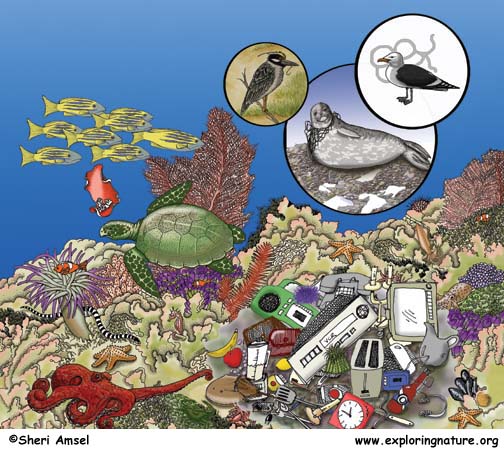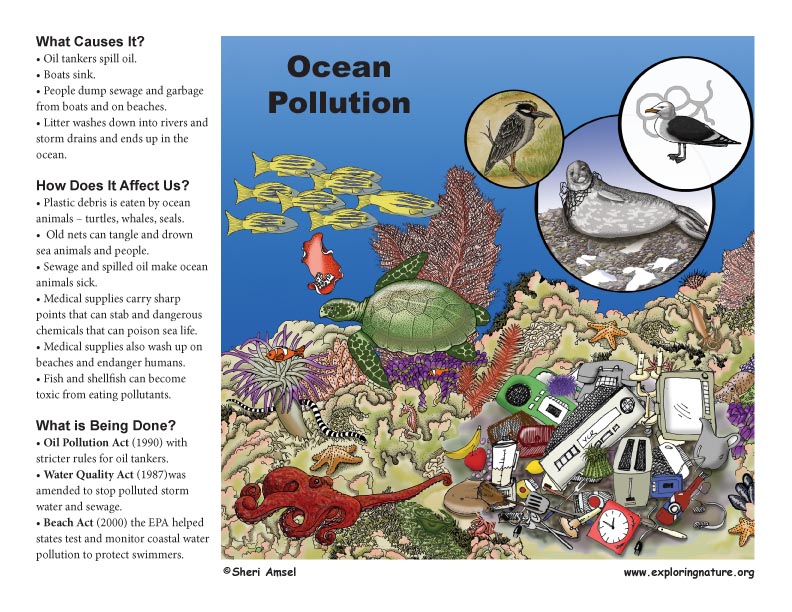

There are many things that are polluting our oceans. Oil tankers spill oil. Boats sink. People dump sewage and garbage from boats and on beaches. Litter washes down into rivers and storm drains and ends up in the ocean.
In 1989 the Exxon Valdez hit a reef in Prince William Sound in Alaska. The huge hull oil tanker cracked open and spilled more than 11 million gallons of crude oil into the sound - the largest oil spill in U.S. history up to that date.
Then in 2010 the Deepwater Horizon oil rig exploded resulting in an oil spill of 205 million gallons into the Gulf of Mexico (11 times the amount of the Exxon Valdex spill). In both cases a great effort went into cleaning up and saving the wildlife and local habitats and still continues today.
Ocean pollution can cause problems for sea life and man. Plastic debris like bottles, bags, styrofoam packing, and fishing wire can be eaten by ocean animals and choke them or get caught in their digestive tracts. Old nets can drown them. Even people scuba diving can get caught in ocean debris and drown. Sewage and spilled oil make sea animals sick. Medical supplies carry sharp points that can stab and dangerous chemicals that can poison. They can also wash up on beaches. Fish and shellfish can become toxic from eating pollutants. They are no longer safe for fisherman to catch and sell.
The Exxon Valdex spill motivated Congress to pass the Oil Pollution Act of 1990 with stricter rules for oil tankers. They have to have sturdier hulls. Ship captains also have to be in better touch with traffic centers to avoid crashing. In 1972, the U. S. government started passing laws to stop ocean dumping. In 1987 the Water Quality Act was amended to stop polluted storm water and sewage from entering the ocean. In 1996 the National Marine Debris Monitoring Program (NMDMP) started a 5-year study of coastal pollution to find out where pollution was coming from, off U. S. coasts. In 2000, under the Beach Act, the EPA helped states test and monitor coastal water pollution to protect swimmers. Organizations like the Ocean Conservancy organize annual beach and coastal clean ups. They collect more than 3 million pounds of trash each year.
Never litter! Try to avoid using plastic bags. A lot of them end up in the ocean. Bring canvas bags to the grocery store whenever you shop. Pick up litter you see on the beach. Keep a garbage bag in the car for litter.
(Included in PDF)
Ocean Pollution - Read and React
1. Name the two worst oils spills in U.S. history:
2. Name three other examples of things that pollute the ocean:
3. Name three ways that ocean pollution affects people.
4. Name two ways that the Exxon Valdex oil spill changed the rules for shipping oil by tankers?
When you research information you must cite the reference. Citing for websites is different from citing from books, magazines and periodicals. The style of citing shown here is from the MLA Style Citations (Modern Language Association).
When citing a WEBSITE the general format is as follows.
Author Last Name, First Name(s). "Title: Subtitle of Part of Web Page, if appropriate." Title: Subtitle: Section of Page if appropriate. Sponsoring/Publishing Agency, If Given. Additional significant descriptive information. Date of Electronic Publication or other Date, such as Last Updated. Day Month Year of access < URL >.
Amsel, Sheri. "Pollution (Ocean)" Exploring Nature Educational Resource ©2005-2024. December 13, 2024
< http://www.exploringnature.org/db/view/1799 >

